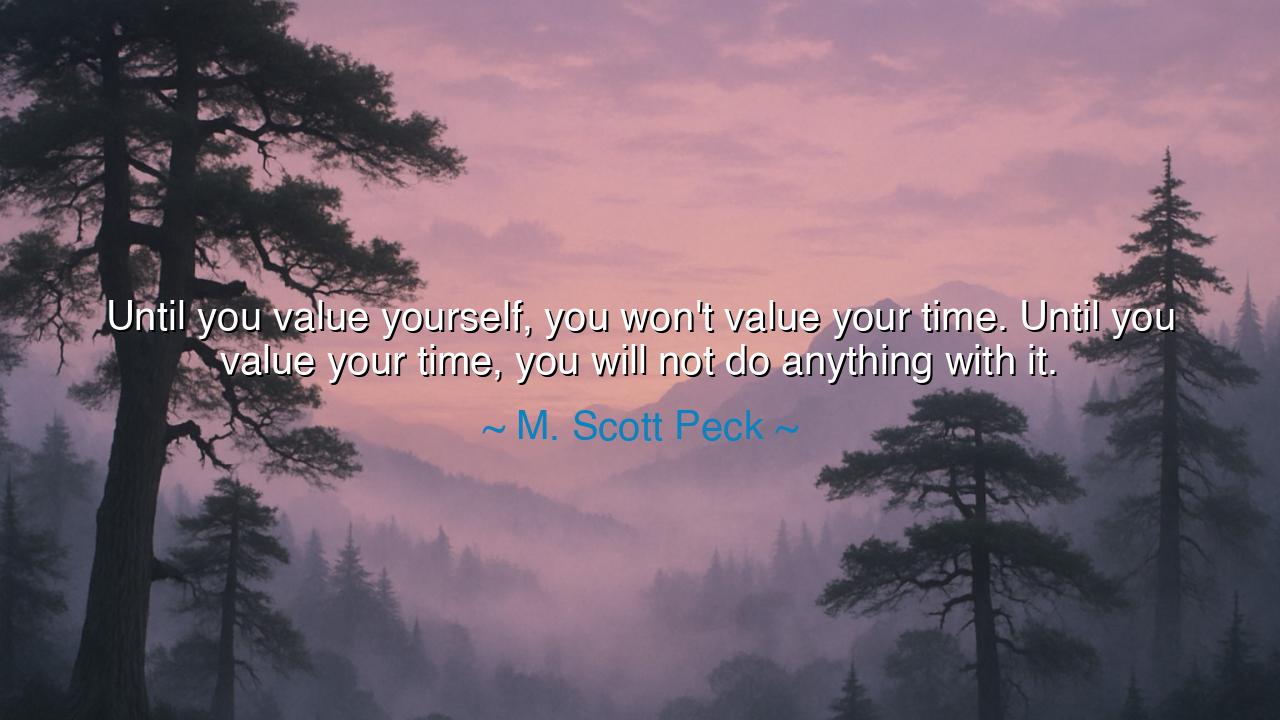
Until you value yourself, you won't value your time. Until you
Until you value yourself, you won't value your time. Until you value your time, you will not do anything with it.






“Until you value yourself, you won’t value your time. Until you value your time, you will not do anything with it.” Thus proclaimed M. Scott Peck, the physician of the soul, whose wisdom pierced through the illusions of self-neglect and sloth. In these words lies a chain of truth: the worth of life begins with the worth of the self. If a man sees himself as dust, he will cast away his hours as though they were pebbles. But if he sees himself as a vessel of purpose, he will guard his time like treasure, and from that treasure he will build deeds of lasting worth.
The origin of this teaching springs from Peck’s reflections as both a healer and a guide. He observed how many squandered their lives not out of malice, but from a hidden wound: the belief that they themselves were unworthy of achievement, joy, or purpose. For such souls, minutes and hours slipped by unused, days drifted into years, and the time that could have built kingdoms or healed wounds was left to wither. Peck’s words are therefore both a warning and a summons: honor yourself, for in so doing you learn to honor your days.
Consider the story of Vincent van Gogh. In life, he struggled with despair, poverty, and rejection. Yet when he began to glimpse the value of his vision—though the world mocked him—he poured his time into canvas after canvas, painting the heavens in swirls of fire and the fields in waves of gold. Though unrecognized in his day, his refusal to waste his hours gave the world treasures of immeasurable beauty. When he valued his gift, he valued his time, and when he valued his time, he left behind a legacy that outlived him.
The ancients, too, knew this truth. The Stoic philosopher Seneca declared that life is long enough if it is rightly used, but most men fritter it away because they do not esteem themselves. A slave who sees himself as nothing wastes his breath in idleness, but a free man who knows his dignity spends his hours as wisely as he spends his gold. Thus, Peck’s modern wisdom is but the echo of an older song: that self-worth is the root of purposeful action, and purposeful action the fruit of valuing time.
Yet there is a danger here: some think to value themselves by pride, boasting of greatness without discipline. But true self-value is humble; it is the recognition not that one is flawless, but that one is capable of growth, capable of labor, capable of love. From this springs the resolve to guard one’s time and not to squander it on vanity or distraction. Pride wastes time; humility redeems it.
The lesson for future generations is clear: if you would accomplish anything, begin first by esteeming yourself. Do not measure your worth by the scorn or praise of others, but by the quiet knowledge that you are a bearer of purpose. Then look upon your hours as jewels, not to be cast aside. For every wasted day is a day that cannot be recalled; every well-spent day is a stone laid in the foundation of eternity.
Practical actions follow from this wisdom: rise each morning and remind yourself of your worth, for the day will not honor you if you do not honor yourself. Set aside time for your craft, your learning, your service, and defend it fiercely from distraction. Say no to what diminishes you, and yes to what strengthens you. In this way, you will live not as a beggar of time, but as its master.
So let Peck’s words echo as a commandment: “Until you value yourself, you won’t value your time. Until you value your time, you will not do anything with it.” Take this into your heart, and let it stir you to action. Value yourself, that you may value your hours. Value your hours, that you may shape your destiny. For a life well-lived begins not with the passing of days, but with the reverence for the self who lives them.






AAdministratorAdministrator
Welcome, honored guests. Please leave a comment, we will respond soon